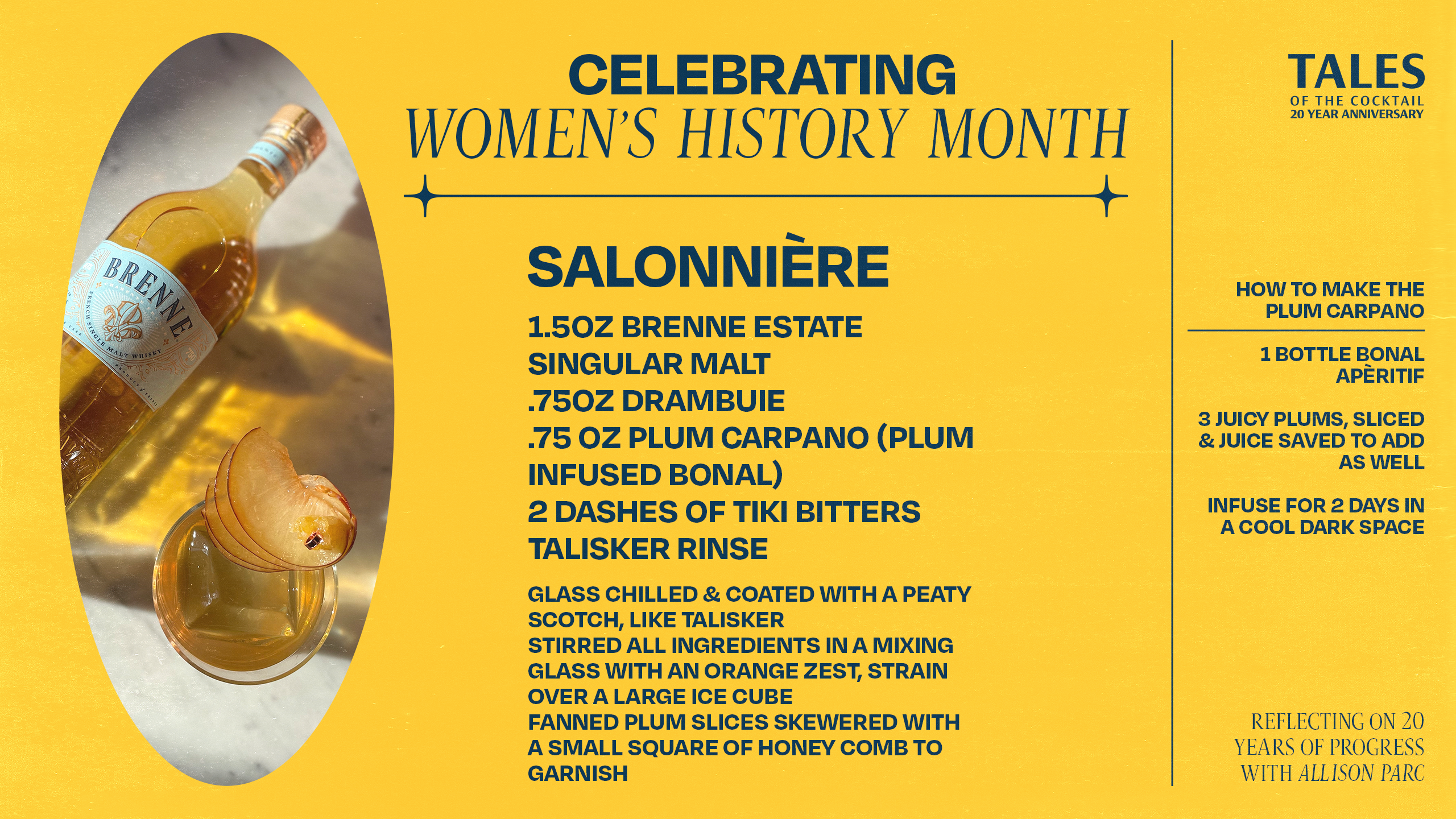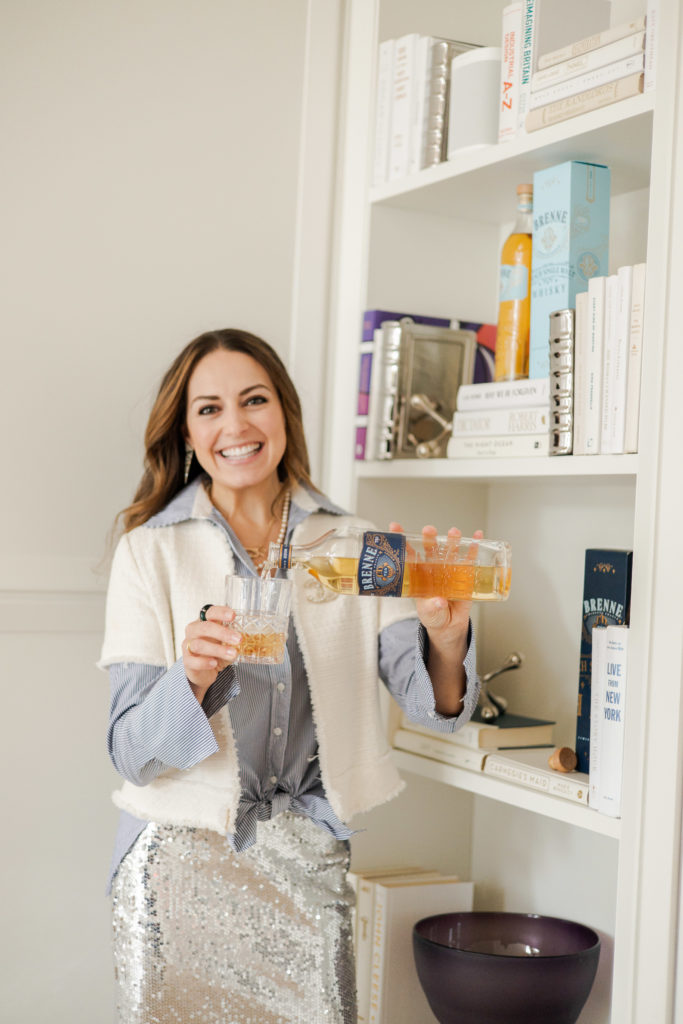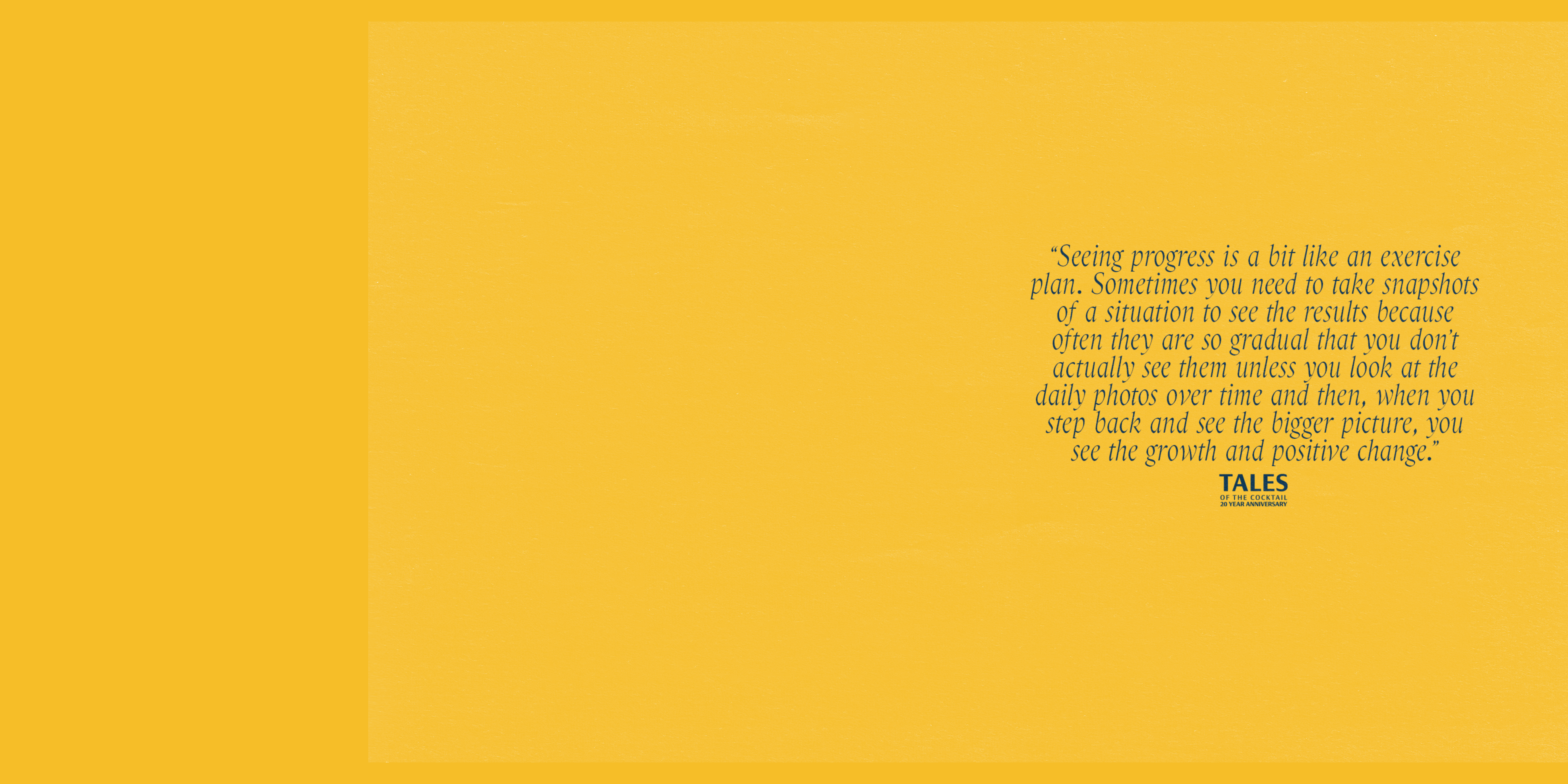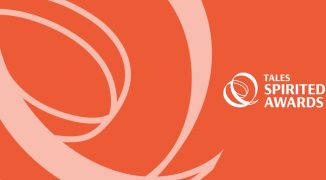I launched Brenne, a single malt whisky made in France, in 2012. At the time, this amounted to me actually riding a bicycle around the streets of New York City hoping to win retailers, restaurateurs and bartenders over with my beautiful Cognac-influenced whisky. Last week, the company I founded and poured my soul into sold to Heaven Hill Distilleries to much celebration and fanfare. A fairy-tale ending (and new beginning) to be sure, one that many brands aspire to do, but that’s not to say any of it was easy.
When Tales of the Cocktail Foundation asked me to write a piece in honor of Women’s History Month about “progress” through the lens of women and whisky over the past ten-plus years, I began to sit and note the evolutions of my own opinions on this topic, many that have changed over the arc of my time with Brenne. As I wrote, I became curious to hear from others about their own views on the topic of progress (or not) on “women and whisky.” Did they differ from mine? How were they similar? Did they see the same things I did?
It’s impossible to deep-dive into the nuances of this topic in one article, or even highlight the rich variety of voices worth hearing about on the subject. To that end, I have contacted some of my respected colleagues in the industry to add color to the conversation, knowing this list of women is incomplete. I hope that by highlighting some of the unique opportunities we have today, we may help open the path to continue moving forward with more inclusivity. Perhaps this can even encourage you to strike up your own conversations on this ever-evolving subject… perhaps even with a Salonniѐre cocktail in your hands as created by Mary Kelly in Washington, DC!

This modern riff on the Rob Roy takes inspiration from the women who hosted the Parisian salons during the French Revolution, where ‘clever’ women sparked a movement that upended an aristocracy. As artists, philosophers, nobles, and society folk gathered to exchange ideas, these formidable hosts not only decided who got a seat in the room, but more importantly, set agendas and steered the conversation. Then, like today, women resourcefully found a way to a table seemingly off limits to them, and these women built their own. A peaty scotch rinse gives the drinker the impression that a traditional single malt is on the way, but Brenne Singular Malt whisky is the star of this show. Beautifully crafted and female-founded, Brenne Estate Cask brings atypical fruit with apѐritif & bitters to what can be thought of as a “Brennhattan.” Drambuie finishes with honey, heather & silk.
In their own words, here shares Georgie Bell (Bacardi, UK), Tracie Franklin (NJAI Leadership Program, USA, DC/TN), Heather Greene (Milam & Greene, USA, TX), and Nicola Riske (Edrington, Spain):
ON THE PAST
Nicola Riske: I just knew that I had to work 10x harder, and that anything I said when presenting to anyone would be discounted if one man entered the room and said something different.
Tracie Franklin: Yeah, lots of Googling under the table!
NR: Yes, and that was unbelievably hard and still happens today.
Heather Greene: Oh my god, Googling under the table. Yes, that still happens. I agree with Nicola, I always felt like I had to hit the ball way harder than anyone else. In 2012, right around the time I met you and Brenne, Allison, I was actually turned down for every single ambassador job at whiskey companies when I was looking. I was told by some insiders that having a woman represent a brand was a “nonstarter.” They were terrified of feminizing whisk(e)y. I am super excited about the progress; I don’t think that happens anymore – at least I hope.
AP: Did you find that you had to work ten times harder, even within the layers of the corporations in which you’ve worked?
NR: No. Thankfully. I think there are hurdles, always. However, what I am always grateful for are the men and women who have welcomed me – in terms of learning, stepping into a distillery, and sharing knowledge– […] I’ve always felt welcomed in the community by those who are working in the distilleries, post-production, and in the labs. They’ve always said, “You wanna learn? Come on in.” Which I feel grateful for. But I put myself out there for it.
HG: I agree with Nicola here again: Those who I worked for — when I was hired as a woman back then — were tremendous allies. I am still friends with so many of them.
AP: Georgie, take us back to your past, your beginnings in the industry!
Georgie Bell: So, I was a bit of a double threat because I was a global ambassador at the age of 23. Which is really young. […] Stereotypes and attitudes to age and gender vary country to country. In some I was totally normal, in others a complete anomaly. In one [country] I was asked whether I was just a “clever marketing campaign” — a complete oversight of my professional skillset and knowledge. This was back in 2015, and I’d like to think that if I was meeting that person for the first time today, that would never cross their mind as times HAVE changed. I know that it’s tedious to still answer the question, “what’s it like to be a woman in whisky?”. In fact, I’ll often compose the answer I want to write “well, I’ve never been a man in whisky, so I wouldn’t know the difference,” delete it, and then write the answer I need to write. Because every time we answer it, we’re reducing the amount of times the future generation will be asked it — we’re changing the narrative.
ON THE PRESENT
TF: The Glenfiddich ambassador role I took prior to my current role focusing on management and distillation, I took because of visibility. I knew that someone seeing a black woman in a scotch whisky company was going to change the perception of who should be drinking and who should be a part of the community. So I do think sometimes we have to think, like Georgie said, beyond what the question is — think about what are the implications and reverberations throughout the industry from us speaking up, speaking out, and being visible.
GB: In the last 10 years of my career, I have witnessed change. There are more women employed in forward facing roles in the whisky industry. There are more women attending whisky shows. I’m proud of how far we’ve come, and in the same breath aware of how far we still need to go. There is light at the end of the tunnel but if the whole of the industry doesn’t move there collectively — and consider EVERYONE from an inclusivity perspective — it’s going to be a hell of a long journey.
Tracie Franklin on the topic of women in whiskey and how the progress in this arena is still not inclusive of all women:
TF: I think the topic of “women and whisky” stops further progress. We are focused on only that, and what has happened is that focus has brought up a lot of white women. Wherever there is a push for equality, white women will actually benefit first because it’s the most comfortable, there’s not as much risk. So, when do we really start to push and say, “Where is true diversity within the world of whisky?” because it hasn’t happened. I was looking at this 15 years ago and there has been little progress.
ON THE FUTURE
AP: Heather, you have worked in many areas of whisky to now run your own brand. What is something you want to see in the future?
HG: I have seen a change too, but where I’d like to see even more of a dramatic shift, is women getting financed to grow businesses and start businesses either directly by creating a brand, or in spirit-adjacent industries such as tech. It’s just starting.
AP: Tracie, I love that conversation you brought up about how “women and whisky stops progress.” Can you share a little more in the framework of “tomorrow”?
TF: Yes! People think that’s enough. Right? If I say, “Well look at all the women now,” they think they’ve done all the work and [the progress] stops. But what happens when we want to start creating spaces that are more accessible? I want to be able to get people involved that have physical disabilities, mental disabilities … true inclusivity is so much broader than we have ever imagined. This industry has not imagined how inclusive we can be.
AP: I think that is incredibly important, Tracie. Thank you for that. Nicola, what are you thinking about the future and progress?
NR: Progress is advancement, growth, continuous improvement. To continue to move forward, it is important to acknowledge the progress that has been made in the past. Although we may not always see it, our industry has grown. Seeing progress is a bit like an exercise plan. Sometimes you need to take snapshots of a situation to see the results because often they are so gradual that you don’t actually see them unless you look at the daily photos over time and then, when you step back and see the bigger picture, you see the growth and positive change. You see the overall progress.
GB: As I said before, we are on a journey. For me, the future is one where we’re no longer talking about this, where we’re no longer having panels about “women and whisky” or answering these questions. We are all custodians of this change. Every one of us has a responsibility in achieving normalization and true inclusivity; if you think it’s “not your business to do so” then please reach out to one of us as we’d be more than happy to suggest how you can. Personally, I’m really proud to be even a small part of this, especially with these four women by my side.
HG: I’m a little fatigued about talking about “women and whiskey” to be honest. I turned down a few opportunities recently. The way I see it, if I’m talking about being a woman in the industry, I’m not talking about other topics that really interest me: building a company, growth, production, life-balance, financing, my staff, awards we’ve won, my book, my time spent traveling around the world for whiskey – you name it! I’m looking forward to that future!
–
AP: Thank you all so much. To our readers, please note that this is a distilled-down excerpt of some incredibly powerful points worth exploring further on the journey our industry is on around the categorization of women in whisky. I believe today that the idea is for all of us to break out of our categories. If we can look around our board rooms, Zoom screens, and happy hours and see a wide range of true, meaningful diversity included, that isn’t just good for the bottom line as studies show: that’s good for the human soul.
Throughout Women’s History Month this March, please join me on Instagram at @AllisonParc as we continue this talk via live conversations & posts with my fellow contributors.
About Allison Parc:

Allison Parc the founder of the award-winning Brenne Whisky; a seed-to-spirit, certified organic, innovative French Single Malt she launched via bicycle in NYC in 2012, which was acquired by Heaven Hill Distilleries in February 2022.
In 2017, 2018, and 2021, Allison was honored with Whisky Magazine’s ‘Icon of Whisky’ award. She’s been written about in Forbes, New York Times, Wall Street Journal, Glamour Magazine and more as well as featured in many books on the subjects of whisky and entrepreneurship.
Allison is a respected speaker on the topics of entrepreneurship, consumer engagement, dramatic career changes, & thriving in male-dominated industries, while residing in New York City with her life partner, Clint Balcom, and their French bulldog, Ernie (the intern).





